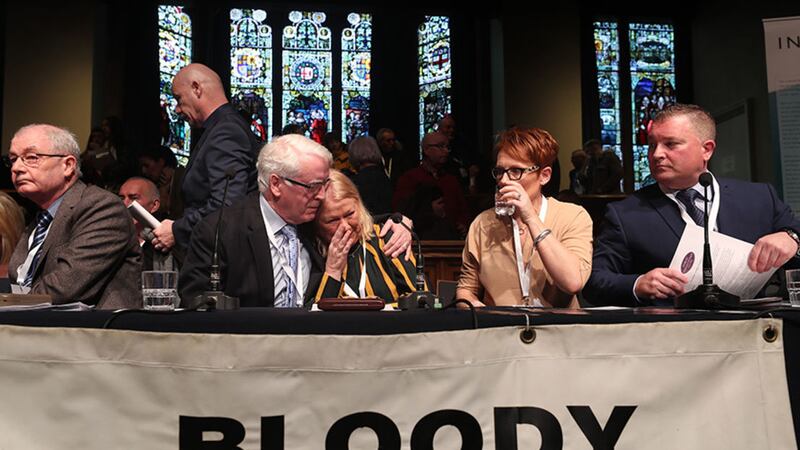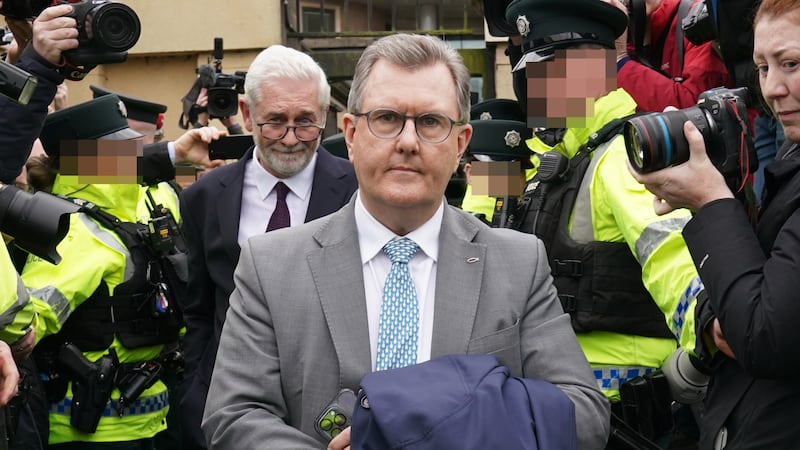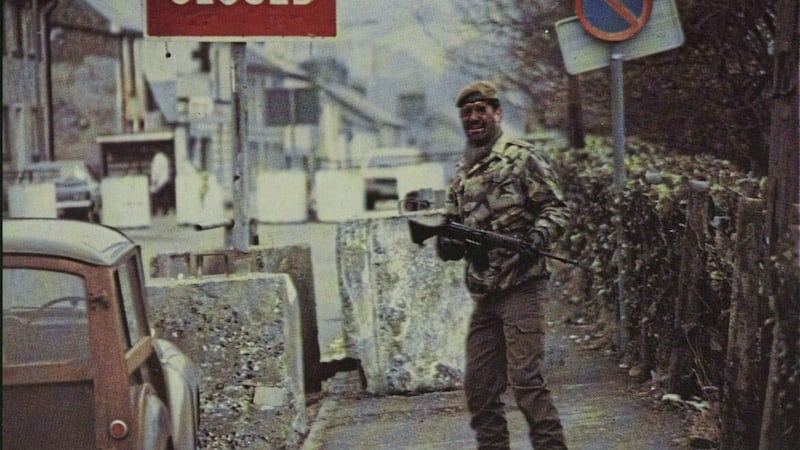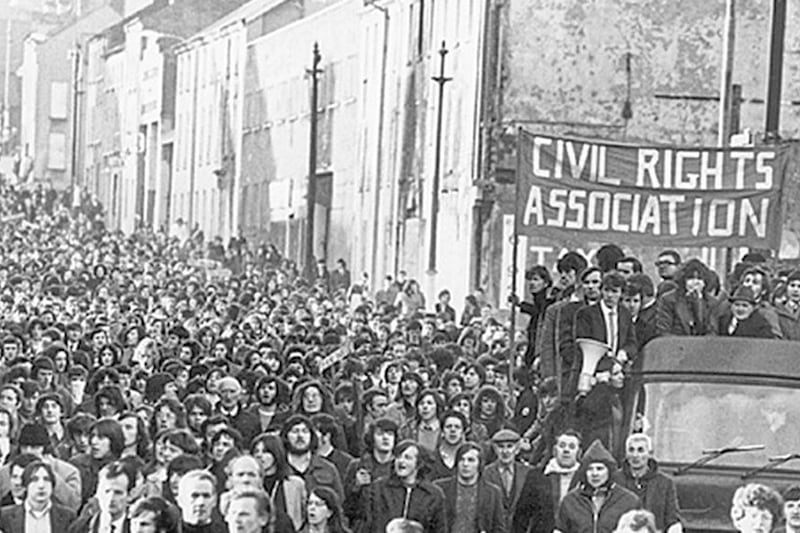Families of those killed on Bloody Sunday have said they are saddened at the news that just one former British solder is to face murder charges over the 1972 killings.
As relatives of those killed gathered in Derry's Guildhall to give their reaction, John Kelly, whose 17-year-old brother Michael was killed, said many had received a "terrible disappointment".
But he welcomed the positive news for the six families impacted by the decision to prosecute soldier F.
"Their victory is our victory," he said.
"We have walked a long journey since our fathers and brothers were brutally slaughtered on the streets of Derry on Bloody Sunday, over that passage of time all the parents of the deceased have died - we are here to take their place."
Mr Kelly highlighted there were legal means of challenging the decisions not to prosecute.
"The Bloody Sunday families are not finished yet," he said.
Read More
- Saville Report: What it said about each of the victims
- Campaigners for Bloody Sunday justice 'set the example for many others'
- Bloody Sunday families respect differing views on prosecutions
Mr Kelly said: "The dead cannot cry out for justice, it is the duty of the living to do so for them.
"We have cried out for them for many years, and now we have succeeded for them."
Legal challenge to decision
Kate Nash, whose brother William was killed on Bloody Sunday, said the families planned to challenge the decision to prosecute only one soldier.
"We're going to challenge this, of course," she told the BBC, and said that she would be instructing her solicitor to begin "a legal challenge".
Solicitor for a number of the Bloody Sunday families, Ciaran Shiels, said: "There are very clear legal avenues that are open. What we will do now is submit further submissions and ask for the decisions not to prosecute to be reviewed. If the reasons given by the Public Prosecution Service do not withstand proper judicial or legal scrutiny, we then challenge by way of judicial review in the Hhigh Court in Belfast."
Geraldine Doherty, whose uncle Gerald Donaghey died, said: "And while we as a group of families and individuals may have differing views on whether or not the soldiers who carried out the shootings should face jail, or how long they should spend in jail, we are all agreed that they should face the due process of the law.
"And they should do so in public.
"The very few British soldiers that were charged during the conflict here were named, and the same should apply to those being charged now. Killers should not benefit from anonymity."
"Their victory is our victory" - John Kelly, whose brother Michael was killed on Bloody Sunday speaks on behalf of the families of the victims, after learning a soldier faces murder charges https://t.co/YbX7IhhOei pic.twitter.com/ZFf801b1MJ
— BBC News (UK) (@BBCNews) March 14, 2019
Justice for all
Mickey McKinney, whose brother Willie was shot dead, said: "Everyone deserves justice, including those whose loved ones were murdered by the British state."
He said it was "disappointing" for families who had not received news of prosecutions, saying: "We are mindful of those families who received that news today, and believe me, there are many."
But he added: "For us here today it is important to point out that justice for one family is justice for all of us."
He said: "We would like to remind everyone that no prosecution, or whenever it comes to it no conviction, does not mean not guilty. It does not mean that no crime was committed. It does not mean that those soldiers acted in a dignified and appropriate way.
Listen to the PPS's statement in full:
Stephen Herron, from the NI Public Prosecution Service, said one soldier will face charges for #BloodySunday:
— BBC News NI (@BBCNewsNI) March 14, 2019
Read more here- https://t.co/T1zKyWgSzk pic.twitter.com/EgZrBEcCS6
"It simply means that if these crimes had been investigated properly when they happened, and evidence gathered at the time then the outcome would've been different."
John Teggart, whose father Danny was killed in a shooting in the Ballymurphy area of Belfast in 1971, said he was there in solidarity with the Bloody Sunday families.
He voiced disappointment that prosecutions were not announced against more soldiers.
"It's a victory for the families and a victory for them is a victory for us also," he said.
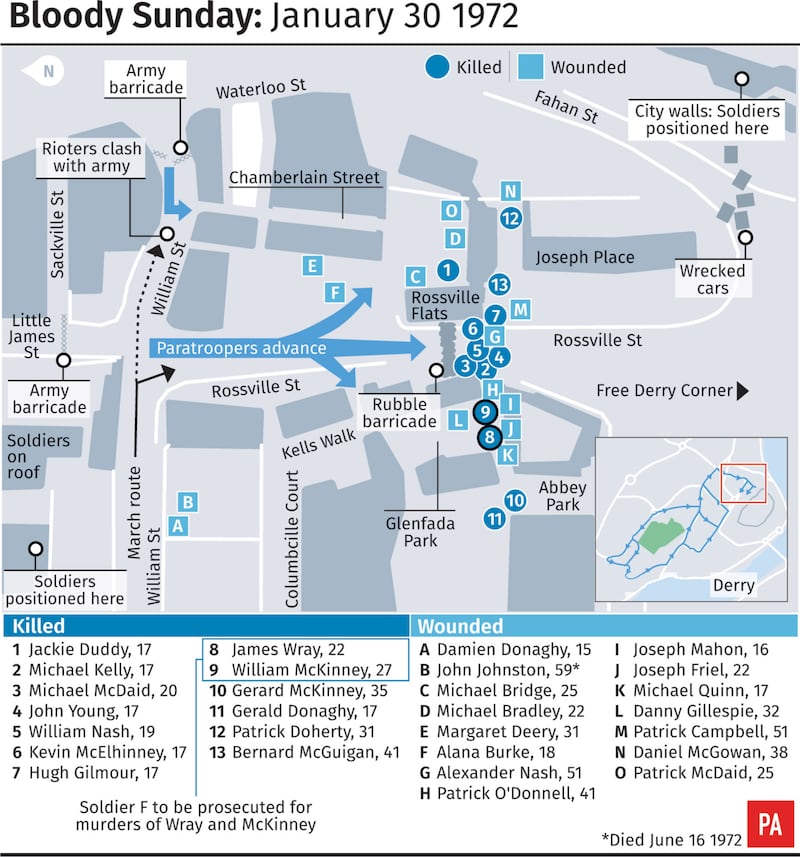
"I'm a bit disappointed that just one soldier was charged.
"But I don't think the fight is over, I would hope the fight is not over, for families like ourselves (the Ballymurphy families), we are here today in solidarity with the Bloody Sunday families like they have supported us for many many years."
Speaking after this morning's announcement, solicitor Ciaran Shiels, said: "This is a remarkable achievement by the families and victims of Bloody Sunday.
"Notwithstanding the unprecedented attempted political interference with the independence of the judicial process, the families have not only succeeded in consigning the Widgery report to history, and securing the complete vindication and declaration of innocence of all of the victims of Bloody Sunday through the Saville Inquiry, they have now secured the prosecution of Soldier F for the murder and attempted murder of six innocent people.
"We are disappointed that not all of those responsible are to face trial.
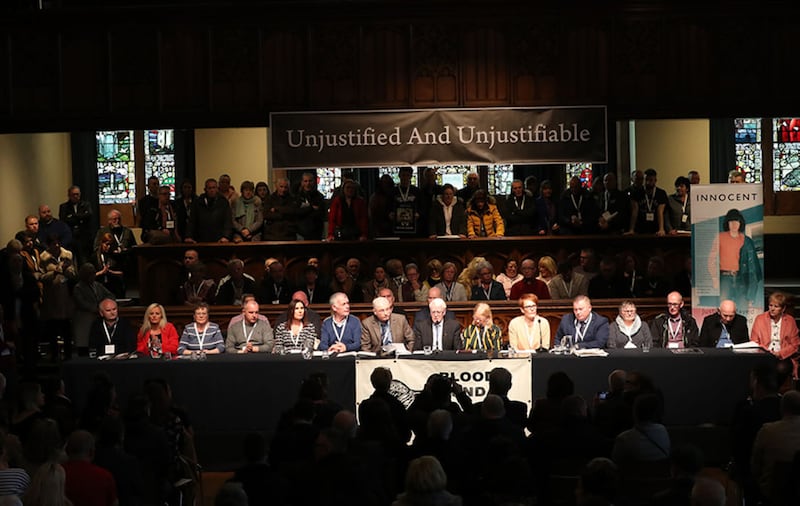
"We will give detailed consideration to the reasons provided for decisions not to prosecute the other soldiers, with a view to making further submissions to the Prosecution Service and we shall ultimately challenge in the High Court, by way of judicial review, any prosecutorial decision that does not withstand scrutiny."
A long road for families
Director of Public Prosecutions Stephen Herron said the decisions in no way undermined the findings of Saville - that those shot were not posing a threat to the soldiers.
He added: "I am mindful that it has been a long road for the families to reach this point and today will be another extremely difficult day for many of them. We wanted to meet with them personally to explain the prosecution decisions taken and to help them understand the reasons.
Read More
- Rollercoaster journey for lawyers who became detectives to seek truth for Bloody Sunday victims
- Bloody Sunday soldier prosecutions were always a 'key demand' for families
"We have spent time with them this morning, given them detailed information and we are committed to further engagement over the coming period."
Mr Herron continued: "There has been a level of expectation around the prosecution decisions in light of the findings of the Bloody Sunday Inquiry. However, much of the material which was available for consideration by the Inquiry is not admissible in criminal proceedings, due to the strict rules of evidence that apply.
"I wish to clearly state that where a decision has been reached not to prosecute, this this is no way diminishes any finding by the Bloody Sunday Inquiry that those killed or injured were not posing a threat to any of the soldiers."
Mr Herron said: "We recognise the deep disappointment felt by many of those we met with today. As prosecutors we are required to be wholly objective in our approach.
Every civilian who died or was injured on Bloody Sunday was an innocent victim who posed no danger to anyone. My thoughts are with all of their families right now. A decision has been made today to pursue a prosecution and it is very important that no one prejudice that process.
— Simon Coveney (@simoncoveney) March 14, 2019
"However, that does not mean that we do not have compassion for all those who are affected by our decisions."
Chain of command
Derry Presbyterian minister David Latimer, who forged a friendship with Martin McGuinness, said prosecutors should "move up the chain of command", up to and including the British defence secretary.
He told BBC Radio Ulster that foot soldiers "are not required to make decisions, they are there to obey orders".
"I'd be wanting... to move up the chain of command because there were decisions taken and there are senior figures who were involved in those decisions and who I think have to really have an opportunity to express the journey they were on and the outcomes that resulted which has brought pain and heartbreak and sorrow."
Support for soldier from British government
Britain's defence secretary Gavin Williamson confirmed the Ministry of Defence would support soldier F and pay the legal costs.
He said: "We are indebted to those soldiers who served with courage and distinction to bring peace to Northern Ireland.
Kate and Linda Nash, who lost their 19-year-old brother William on Bloody Sunday talk about the shock, sadness and disappointment after the soldier who shot their brother dead and injured their father as he went to his son’s aid, will not face prosecutions pic.twitter.com/aL7decEnbb
— Q Radio News (@qnewsdesk) March 14, 2019
"The welfare of our former service personnel is of the utmost importance and we will offer full legal and pastoral support to the individual affected by today's decision. This includes funding all his legal costs and providing welfare support.
"The Ministry of Defence is working across government to drive through a new package of safeguards to ensure our armed forces are not unfairly treated.
"And the government will urgently reform the system for dealing with legacy issues. Our serving and former personnel cannot live in constant fear of prosecution."
The British prime minister's official spokesman said: "Clearly, we are indebted to those who served with courage and distinction to bring peace to Northern Ireland.
"The welfare of our former service personnel is of the utmost importance and we will offer full legal and pastoral support to anyone affected by today's decision.
"We recognise the suffering of anyone who lost loved ones during the Troubles. As this is now an ongoing legal matter, it would be inappropriate to comment further."
Founder of the Justice for Northern Ireland Veterans group Alan Barry said: "It's one soldier too many as far as we're concerned.
"It's very one-sided. No soldier should be charged. It happened 47 years ago, a line in the sand needs to be drawn and people need to move on.
"Under the terms of the Good Friday Agreement veterans are being left open to prosecution while terrorists have been cleansed of their past crimes."
Politicians react
Sinn Féin's leader in the north Michelle O'Neill said: “There is of course huge disappointment that only one former soldier has been charged with two counts of murder and four attempted murders.
“We share that disappointment and the sense of incredulity at this decision, given the clearly established facts about the actions of the British Army on Bloody Sunday.
“But even the fact that one former soldier is to face trial is a significant achievement. I also commend the dignity and solidarity shown by the families today in response to the decision. As they said themselves, justice for one family, is justice for them all."
SDLP leader Colum Eastwood said that the PPS decision to prosecute a single soldier over Bloody Sunday marks another difficult day for families.
"Today's announcement from the Public Prosecution Service is another difficult day for many families who wanted to see those responsible for the murder of their loves ones face the full force of the law. They will be incredibly disappointed today," he said.
"This campaign for truth, justice and accountability has been met with prevarication, equivocation and obstruction at every level. In sharp contrast, the unshakable dignity and solidarity of the families has been immense.
"I welcome the decision to prosecute Soldier F. The absence of prosecution for others is not, however, a vindication of their actions. They remain unjustified and unjustifiable.
"As Mayor of Derry, I walked proudly with the Bloody Sunday families as we received the Saville report. We will continue to stand with them as they campaign against the heinous wrongs that have been committed against them and against our community.
Tory former defence secretary Sir Michael Fallon said it should not just be forces personnel who are prosecuted.
He told BBC Radio 4's World At One: "I think it would be nice for everybody if we started to hear about some of the IRA terrorist cases being reopened and some of them being put on trial...
"It's very important that if we're going to have a process like this that IRA men are also investigated and where necessary, where there is the evidence, prosecuted as well.
"It would be quite wrong simply to prosecute those who served."
Conservative MP and former British Army officer Johnny Mercer tweeted that it was the result of "an abject failure to govern and legislate, on our watch as a Conservative administration".
"When I speak of a chasm between those who serve and their political masters in this country, I mean this," he added.
A spokesman for the government in Dublin said: "The Irish government has noted the announcement today by the Public Prosecution Service for Northern Ireland that following a PSNI investigation, one former soldier will be prosecuted for the murder of James Wray and William McKinney and for the attempted murders of Joseph Friel, Michael Quinn, Joe Mahon and Patrick O'Donnell on Bloody Sunday in 1972.
"Our thoughts are with all the families of those who were killed and those injured on Bloody Sunday, for whom today will be another difficult and emotional day.
"The Department of Foreign Affairs and Trade is keeping in contact with the families at this time on behalf of the government.
"All victims' families deserve, and must have access to, effective investigations into killings that took place, and have the opportunity to find justice in accordance with the law and regardless of the perpetrator."
Grainne Teggart, from Amnesty International, said: "Today is a stark reminder that victims have long been paying the price for the failure of government to effectively deal with the past. We call on the UK Government to ensure there are no barriers to justice and make clear there will be no amnesty for human rights abuses, including those committed by security forces.
"All victims of human rights violations and abuses from Northern Ireland's conflict have a right to an independent investigation, with the possibility of prosecutions to follow where the evidence leads. To remove this recourse would be a betrayal of victims' fundamental right to justice."
